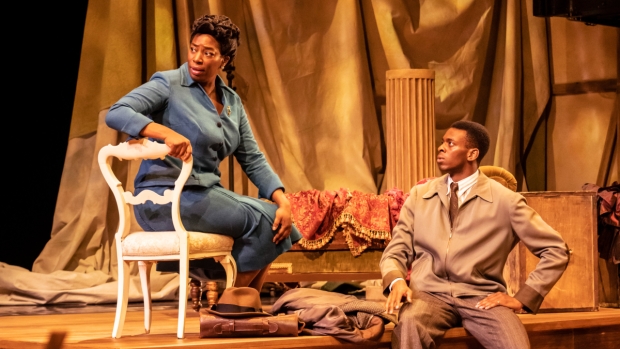Trouble in Mind review – a bracingly relevant play whose time has finally come
Alice Childress’ radical satire of racism in the theatre continues its run through to 29 January 2022

© Johan Persson
Although first presented off-Broadway in 1955, and seen at Theatre Royal Bath and London's Coronet Theatre in 2016-17, Trouble in Mind feels very much like a play whose time has come. How else to explain a simultaneous Broadway bow (the original failed to transfer to the Main Stem when author Alice Childress refused to change the more uncompromising aspects of her text to appease mainstream audiences) starring Tony-winner La Chanze, and a major National Theatre revival with Tanya Moodie, who also led the most recent UK production. Studying systematic racism through the prism of a witty, well observed backstage comedy drama, this is a play that celebrates theatricality while attacking the troublesome tropes that went unexamined for generations within the industry, and in the world at large. It feels bracingly relevant, even more so than five years ago.
If this new production resonates more than Laurence Boswell's earlier rendering that's partly because it has a Black woman at the helm (director Nancy Medina) who brings an urgency and authenticity to the text that was missing from that rather more languid version. Also, the world is now a different place, in the wake of the Black Lives Matter movement and the #MeToo revelations, and the thrust and parry of the impassioned arguments here play quite differently now. Anybody who starts off under the impression that Trouble in Mind is concerned only with a rarefied theatrical milieu, will be brought painfully short by a second half speech by a senior actor (Cyril Nri, delivering a masterclass) describing a lynching he witnessed as a small child. It is horrible, but it is also eloquently, brutally well written and gives added weight to the anger and outrage expressed elsewhere.
Medina brings pace, humour and a breathtakingly clever central idea. The play depicts a multi-racial cast tackling a clumsily worthy melodrama while their white director goes on a power trip; we see the characters squabble, miscommunicate and bond while rehearsing their show. Medina sets each discrete section in a different historical time period: the initial act – the first day of rehearsal – is very much in the play's original time, where Black actors eked out a living by constantly kowtowing to the Caucasian power players. The second act features the same set of actors returning from their first lunch break, but in the 1960s …and the final section sees these characters still working on the same script, but in a more contemporary time, and the shift in the power base is palpable. With each section, the acting style becomes more naturalistic, the sometimes tiresome mugging and heightened declaiming of the first scenes giving way to a sort of hyper-realism by act three, as veteran actress Wiletta goes head-to-head with the problematic director in an electrifying exchange that starts out about the script but explodes into an excoriating debate about race and perceived tolerance. It's not too much of a stretch to imagine that this is what Childress refused to modify to make the play more palatable for 1950s Broadway. She was so right.
Moodie's Wiletta was excellent the first time around but has acquired a further majesty and power, aided by Medina's fascinating new concept. If some of the acting feels a little heavy handed at times, that may well settle down as the run continues. There's beautiful work though from Gary Lilburn as a veteran stage manager still touchingly in love with the theatre and Daniel Adeosun as an ambitious young actor on the upward climb. Naana Agyei-Ampadu is gorgeously funny as a glamorous would-be rival to Willetta, and Rory Keenan brilliantly brings texture, charisma and a reptilian energy to the director, a man whose self-satisfied authority is cracked wide open by close of play. Rajha Shakiry provides an evocative backstage set.
Every performer deserves a finale equivalent to the coup de theatre Medina gives Moodie at the conclusion of this satisfying revival: rock solid, centre stage, arms aloft, under blazing lights to tumultuous applause (live and pre-recorded) on a raised stage that she literally and metaphorically pushed physically forward. It's a powerful metaphor: in that moment she is every Black actress who overcame obstacles to success then kept that ladder coming after she'd climbed it: she's Viola Davis, she is Cicely Tyson, she is Phylicia Rashad, she is Sharon D Clarke achieving an acclaimed Broadway debut… most importantly, she is Wiletta Mayer as embodied by Tanya Moodie, one of this country's finest, spearheading a major Black play on one of the UK's foremost stages. Rejoice, it's spine-tingling.












